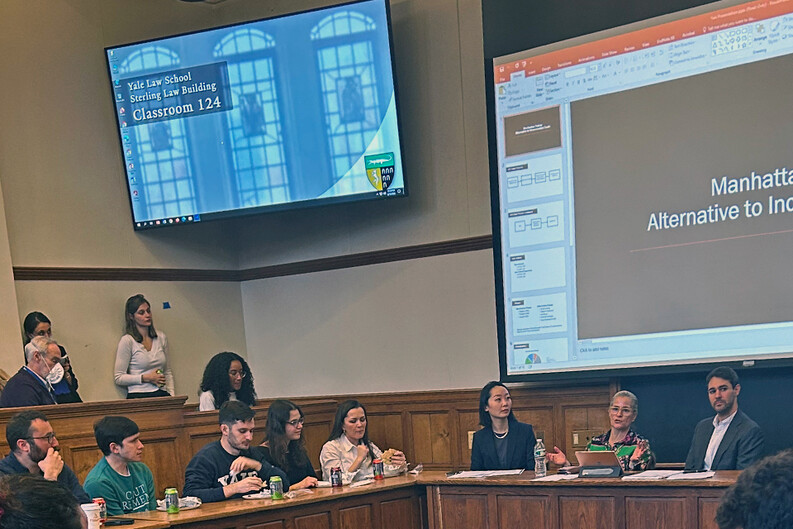Panel Brings Manhattan Felony Alternative-to-Incarceration Court to Yale Law School

In a lunchtime panel on Feb. 15, an audience at Yale Law School and on Zoom gathered to learn about an innovative alternative sentencing program, the Manhattan Alternative-to-Incarceration (ATI) Court. The discussion featured two panelists key to making the court work: the presiding judge and a leader who coordinates programs. Speakers were Administrative Judge Ellen N. Biben of the New York County Supreme Court, Criminal Term, and Joe Barrett, Project Director of Manhattan Justice Opportunities, an initiative of the Center for Justice Innovation. Liman Fellow-in-Residence Grace Li, who is researching the ATI Court, served as moderator and panel organizer.
Launched in 2019, the ATI Court expands on models in which people with addiction and mental health challenges were provided opportunities to avoid incarceration. ATI is distinctive in that it is not limited to individuals with specific needs. Instead, it offers alternatives to incarceration for all types of felony cases, including violent offenses. The court uses individualized treatment plans to respond to each participant’s needs and links them to services that include employment, housing, education, mental healthcare, substance use treatment, and assistance in navigating the criminal legal system. The program aims to prevent recidivism through a comprehensive, collaborative approach that integrates programming with court supervision and monitoring.
“Our goal was to create a court where no charge was disqualifying, where the approach to the disposition was not formulaic, and that the dispositions would be negotiated after a full assessment by a clinically-trained, independent third party,” Biben said. To that end, “we’re bringing together social workers and doctors and all different kinds of clinicians with the courts, with the defense providers, with DAs, and it really does take that team to make these dispositions work.”
Biben added that monitoring each case is important.
“It’s critical to our success that we have this independent third-party agency that does the assessments and that they stay along to case manage,” she said.
To provide clinical assessments and ongoing case management, the ATI Court partners with a team of social workers and case managers from the Center for Justice Innovation. Originally called the Center for Court Innovation, this independent nonprofit grew out of the Midtown Community Court, a pioneer in what is called “problem-solving courts.” The center addresses urgent issues related to safety, justice, and community well-being by piloting programs to test new ideas, performing original research to determine what works and what doesn’t, and providing expert assistance to justice reformers around the world.
Barrett described the ATI Court as the first in the country to adopt this approach.
“No one is excluded. We do a case-by-case determination on each case, and that means we’re able to serve people with very serious charges, including violent offenses,” he said. “The majority of cases we serve are violent charges and people with serious social service needs who typically would’ve been excluded from other programs.”
For a case to be sent to the ATI Court, there must be interest by both the defense attorney and prosecutor. Next, program staff begin the process.
“We have an amazing team of court resource coordinators and clerks who manage the referral processes behind the scenes and prepare the case for my team, which comes in at the clinical assessment stage,” Barrett said. “The social workers on my team . . . do holistic needs assessments and try to figure out what’s going on in people’s lives related to mental health, substance use, trauma history, employment, education, housing, familial network, and social support. We truly make an effort to understand the whole person.”
Since 2019, there have been some 500 case assessments with almost 100 people who have completed the program. Barrett said the completion rate is “a little above 70%.”
Audience questions probed the ATI Court’s costs, demographics, and the challenges of finding service providers to match defendants’ language needs and treatment needs. Biben also responded to a question about the role victims play in her decision-making.
“Not all of the cases are victim cases but we certainly have violent cases that involve victims,” she explained. “It is important to us to make sure the victim is heard in this process. I do require in cases where there is a victim, that the victim be given a voice if they want one. The victim’s view has to be addressed. In New York, by law, the victim has a right to make a victim impact statement before an individual is sentenced.”
Biben also explained that the ATI Court is developing restorative justice programs to provide additional avenues for victim involvement and support.
The event, a part of the Quinnipiac-Yale Alternative Dispute Resolution Workshop4, was co-sponsored by YLS Defenders, the Center on Dispute Resolution at Quinnipiac University School of Law, and the Arthur Liman Center for Public Interest Law5 at Yale Law School.


